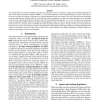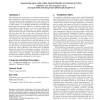134
click to vote
AAAI
2010
15 years 3 months ago
2010
The goal of testing is to discriminate between multiple hypotheses about a system--for example, different fault diagnoses--by applying input patterns and verifying or falsifying t...
120
click to vote
IKE
2004
15 years 4 months ago
2004
Analogy-based hypothesis generation is a promising technique for knowledge discovery. However, some hypotheses generated are nonsensical. This paper describes a two-phased method ...
126
click to vote
DMIN
2006
15 years 4 months ago
2006
- Filtering the immense amount of data available electronically over the World Wide Web is an important task of search engines in data mining applications. Users when performing se...
101
Voted
LREC
2008
15 years 4 months ago
2008
The research field of "extracting knowledge bases from text collections" seems to be mature: its target and its working hypotheses are clear. In this paper we propose a ...
ICMLA
2007
15 years 4 months ago
2007
We construct machine learned regressors to predict the behaviour of DNA sequencing data from the fluorescent labelled Sanger method. These predictions are used to assess hypothes...
FLAIRS
2008
15 years 5 months ago
2008
This paper presents a syntactic path-based learning algorithm (CANDEL from CANDIDATE-ELIMINATION) for the coreference resolution of pronouns that have their antecedents in the sam...
127
click to vote
ATAL
2007
Springer
15 years 6 months ago
2007
Springer
We investigate the properties of a multiagent system where each (distributed) agent locally perceives its environment. Upon perception of an unexpected event, each agent locally c...
109
click to vote
COCO
2001
Springer
15 years 7 months ago
2001
Springer
We use hypotheses of structural complexity theory to separate various NP-completeness notions. In particular, we introduce an hypothesis from which we describe a set in NP that is...
113
click to vote
CVPR
2010
IEEE
15 years 7 months ago
2010
IEEE
We present an approach to visual object-class recognition and segmentation based on a pipeline that combines multiple, holistic figure-ground hypotheses generated in a bottom-up,...
103
click to vote
FSTTCS
2004
Springer
15 years 8 months ago
2004
Springer
We consider hypotheses about nondeterministic computation that have been studied in different contexts and shown to have interesting consequences: • The measure hypothesis: NP d...



